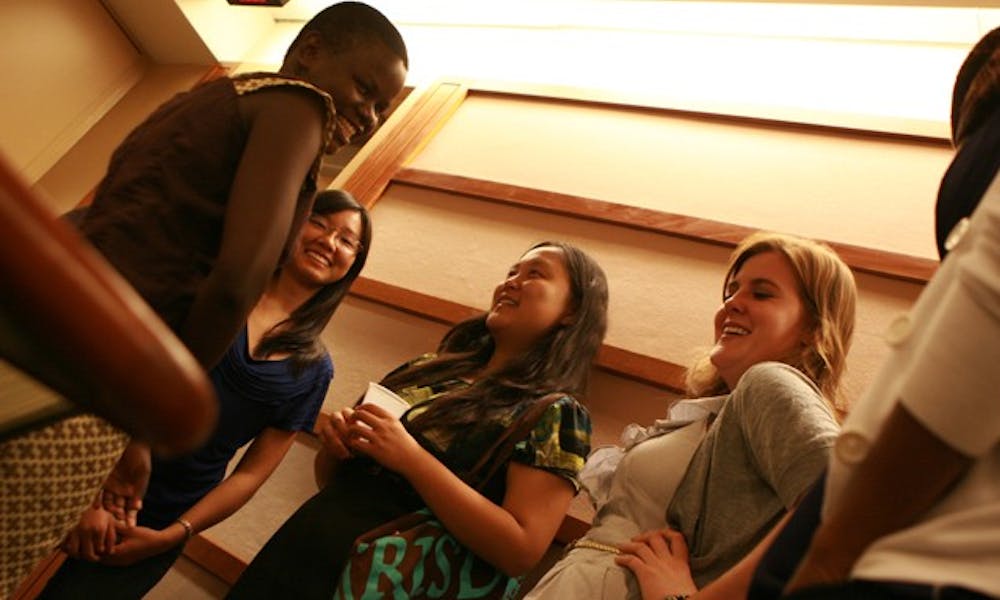A major Duke initiative is helping to change the lives of many women and girls in Kenya.
A panel from the Women’s Institute for Secondary Education and Research discussed the program’s outreach efforts in Muhuru Bay, Kenya Thursday. WISER co-Founder Sherryl Broverman, associate professor of the practice of biology, said the program has had a positive impact on the women in the community since its inception in 2010.
Broverman and other WISER members have helped 60 girls move from disease and poverty stricken areas to the WISER school to receive an education.
In the discussion, she noted the difficult circumstances facing women and girls in Muhuru Bay, a region near Lake Victoria in Kenya. The lake serves as both a blessing and a curse—the community depends on the fishing industry for food and trade, but as a large body of water, it fosters the spread of malaria and draws fishermen—many of whom are HIV positive and exploit women for sex.
“Women in Muhuru Bay are locked out of any kind of economic growth,” Broverman said.
Many women and girls are forced to trade sexual favors so they can support their families, often contracting AIDS in the process. Girls who pursue an education often have to use sex to fund their schooling. The cost of an education often pushes girls to resort to prostitution or having sex with male administrators and teachers.
“A girl slipped a note under my door asking if she should stop having sex with the man paying for her education because she was afraid of getting AIDS, but she didn’t want to drop out of school,” Broverman said. “Girls are making hard economic choices that a 14-year-old girl shouldn’t have to make.”
Broverman introduced panelist Floviance Akoth, a teenage student at the WISER school. Akoth described hardships she faced before enrolling in the school.
“The most important thing was to introduce people from the community,” Broverman said. “As much as I can talk about the challenges of girls in Kenya, it’s nothing like hearing Floviance talk about her life.”
Before her 10th birthday, Akoth had to care for her sick mother by getting fish from the lake and trading it for food and medicine, while taking care of her younger sister. When Akoth’s mother died, her father took Akoth and her sister into his home. A year later, Akoth passed the Kenya National Examination that allowed her to go to secondary school.
“I took the exam and passed, but I couldn’t go to secondary school because my father didn’t have the money,” Akoth said. “Since I was 14, he told me to get married, but I begged him to give me one more year.”
Instead of attending the local secondary school, Akoth was accepted into WISER’s first class of students. She said she now aims for a medical career.
WISER Principal Dorcas Oyugi said the school has transformed the lives of many of its students.
“The change that is WISER will really show in the next three years,” Oyugi said. “What you see here is beautiful and impressive—these girls are amazing, and they have lots of energy.”
Students who attended the panel recognized this spirit in the WISER representatives.
“It was so interesting to hear how her life has changed from her background and hardship to now,” sophomore Radhika Patel said. “She has confidence in herself to pursue her life and the aspiration to even go onto university.”
For some, the panel inspired the possibility of helping WISER in Kenya through Duke.
“I’m interested in going over to Kenya and seeing what life is like there,” sophomore Hannah Brown said. “To hear from a girl from there for the first time and to get a personal connection was amazing.”
Broverman said that she wanted to show the big picture to students.
“Duke students have had a lot of ownership of WISER, and they should be proud of what they have helped accomplish overseas,” Broverman said. “It’s a perfect example of knowledge and a society where students can learn about these issues in a very contextualized way.”
Get The Chronicle straight to your inbox
Signup for our weekly newsletter. Cancel at any time.

